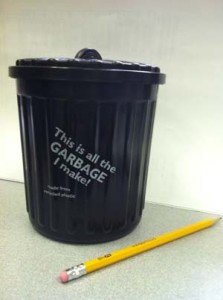

As part of the campus-wide recycling program, organizers say the new trashcans can help divert 1.4 million pounds of waste from landfills in a five-year period and provide operational benefits for the University. The program launched on Earth Day and will roll out in full later this spring.
University of Michigan-Dearborn joins other leading universities in implementing single-stream recycling, a system that simplifies recycling for the entire campus community. By accepting a wider variety of materials and allowing them to all be placed in one container, single-stream recycling leads to increased participation and improved recycling rates.
“The majority of materials we handle each day at our desks are recyclable. What is left as trash is mostly food waste or wrappers,” said Kate Pepin, facilities planning director. “People will be surprised at how little trash they make.”
Pepin said the goal is to eliminate waste without negatively affecting employees. To that end, the program focuses on convenience:
- More recyclable materials, including all types of paper like office paper, magazines, catalogs, junk mail, envelopes, sticky notes, all plastic containers numbered 1-7, metal cans, glass bottles and jars
- All recyclables can be mixed together in the same bin
- New containers for trash and recycling will be placed in offices and across campus
- Centralized collection areas streamline pickup
Recycling will be as easy as throwing away trash in new recycling containers that will be located next to a companion trashcan. Old office trashcans will be “recycled” into new recycling containers for staff and faculty. And since more materials can now be recycled, trashcans will shrink to a mini-sized trashcan.
“Discarding trash in this way only takes moments,” Pepin said. “It’s as simple and convenient as leaving your trash curbside at your home.”
The program expansion follows a successful pilot program conducted at the University Center. Since last summer, students, faculty, staff and visitors to the UC have been able to recycle paper, plastic, metal and glass items.
“We are pleased with the success of the pilot program at the UC,” said Kathleen Herr, director of UC operations. “The program is convenient and it was amazing to see just how much we can recycle.”
Participants in the pilot program diverted about 70 percent of waste from entering landfills.
Efficiencies gained from the new recycling program, combined with the increased diversion of material from the waste stream, will provide both operational and environmental benefits. With a new streamlined approach, custodial services will experience a cost savings by servicing central containers rather than travel desk to desk. The operational savings is projected to be around $25,000 year.
Over a five-year period, the recycling efforts of University of Michigan-Dearborn and the new expanded program are projected to divert 1.4 million pounds of materials from the landfill, avoid emissions that is the equivalent of taking 69 cars off the road, and conserve 4.3 million gallons of water, 3.4 million kilowatts of energy and almost 10,000 trees.
For more information about the new recycling program, please contact [email protected].
Faculty and staff members interested in becoming more involved in this and other sustainability programs are invited to become “Stewards of Sustainability.” The mission of this new organization is to bring sustainability to the grassroots level across campus. Stewards will help colleagues familiarize themselves with the new recycling program and integrate sustainability into the day-to-day actions of the workspaces.




